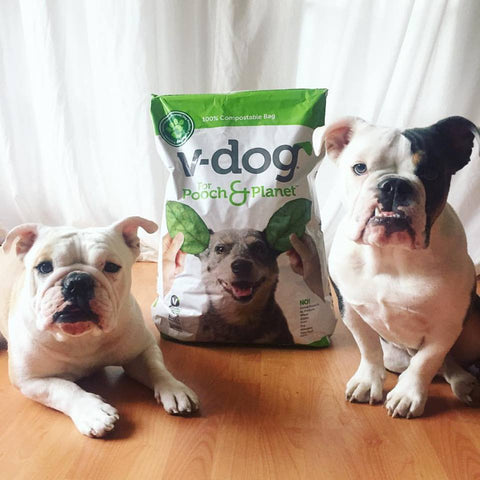3 Studies on Vegan Diets for Dogs
Since 2005, v-dog has seen dogs of all shapes and sizes thrive on our nutritionally-complete food for dogs. A recent comprehensive study in Animals journal (July 2016) by veterinarian Dr. Andrew Knight highlights the science on vegan dogs.
"A significant and growing body of population studies and cases suggest that cats and dogs may be successfully maintained on nutritionally sound vegetarian diets long-term, and indeed, may thrive. Such diets have been associated with benefits such as improved coat condition, allergy control, weight control, increased overall health and vitality, arthritis regression, diabetes regression, cataract resolution, and decreased incidences of cancer, infections, hypothyroidism and ectoparasites (fleas, ticks, lice and mites). Deviations from normal ranges within blood test results do occur, but are uncommon, and rarely appear associated with clinical signs of disease." -Dr. Andrew Knight

Study by Semp (2014)
"Semp studied companion animals in Austria, Germany and Switzerland. Owners were sourced using notice boards in veterinary practices, articles in various Facebook forums, and word of mouth. They were asked to complete a questionnaire about their experience feeding their...dogs a vegan diet, which was followed by a clinical examination and blood tests on 20 dogs...that were randomly selected. The standardized clinical examination included assessments of general appearance, body condition, skin and coat, lymph nodes, vital signs; cardiovascular, respiratory and digestive systems; and defecation. Haematological (complete blood count) and biochemical (liver, kidney, and pancreatic) parameters were assessed, as well as levels of magnesium, calcium, iron, total protein, folic acid, vitamin B12, and carnitine.
174 dog owners [completed the questionnaire]. Animal participants were required to have eaten an exclusively vegan diet for at least six months...Participating dogs had eaten vegan diets for six months to seven years, with a mean of 2.83 years. Thirty-nine percent of participating owners used only commercially-available diets. Nine percent used only homemade diets, and the remaining 52% used mostly commercially-available diets (but regularly mixed these with homemade ingredients). Thirty-eight pet owners independently reported healthier and shinier coats after transitioning to vegan diets. Some animals, previously prone to scaly or oily coats, no longer showed signs of dermatological problems. Sixteen owners described improved odours of their pets. Some also noted increased stool volumes and improvement of stool consistency.
During standardized clinical examinations, no abnormalities were detected that were associated with diet...When considering blood test results, serum total protein of all 20 dogs...studied were within normal ranges...No significant differences were evident in any of the tested parameters, compared to the dogs fed a conventional diet. In particular, lower levels of iron and vitamin B12 in vegan dogs were not observed. Not even the 10% (2/20) dogs fed a homemade supplemented diet showed any significant deviations."

Study by Brown et al. (2009)
"It is difficult to envision any companion animals placed under greater physical demands than sprint-racing Siberian Huskies. During sprint races, these dogs run fast through snow, while hauling sleds, for much of the 30-mile race duration [53].
In 2009, Brown and colleagues [52] reported the results of a study of 12 sprint-racing Siberian Huskies fed either a commercial diet recommended for active dogs (n = 6), or a meat-free diet formulated to the same nutrient specifications (n= 6). The commercial diet contained 43% poultry meal, which was replaced by maize gluten and soybean meal in the meat-free diet. The dogs were fed these diets for 16 weeks, which included 10 weeks of competitive racing.
Health checks were conducted by a veterinarian blinded to the dietary regimens. All dogs were assessed as being in excellent physical condition, and none developed anaemia or other detectable health problems."

Study by PETA (1994)
"In 1994, People for the Ethical Treatment of Animals (PETA) reported results of a systematic survey of the health of 300 vegetarian dogs sourced from 33 states within the U.S. and Canada via PETA’s newsletter [54,55]. Dogs ranged in age from young puppies to 19 years old, and included a wide range of breeds, males and females, both neutered and entire. Of these, 65.3% (196/300) were vegan, with the remaining 34.7% (104/300) simply vegetarian. They had been maintained on these diets for anywhere from less than two, to over nine years, with an average of 5.7 years. The precise diets used, and their level of nutritional adequacy, are unknown. Twenty-eight deceased dogs were included in the survey, with the median age of death being 12.6 years...Over 80% of dogs maintained on vegan or vegetarian diets for 50% to 100% of their lifetimes were reported as being in good to excellent health."
We want the best for your dog. We also want the best for all animals and for the planet, which is why we make 100% complete nutrition for dogs that has all of the healthy, sustainable stuff your dog needs (like clean pea protein, quinoa, lentils and blueberries) without any of the stuff they don’t (animal products, fillers, corn, soy, wheat). If we can feed our beloved fur babes a food they love without harming other animals in the process, we ask the simple question: why not?
To learn more, please visit our website, or say hello at support@v-dog.com.
Ask the Vegan Vet - Does my dog need to eat meat?
Real stories from happy, healthy v-dogs







